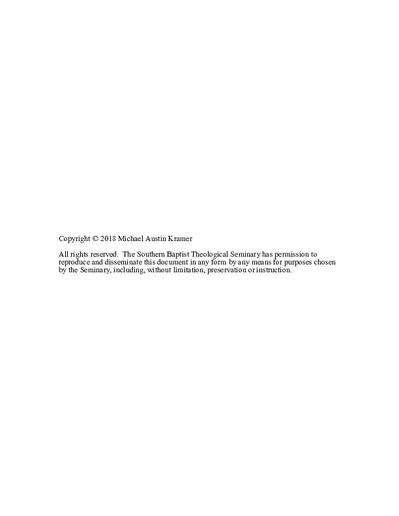A Leadership Profile of the Successful Transitional Pastor: A Delphi Study
Subject
Pastoral theologyClergy--Office
Clergy--Appointment, call and election
Christian leadership
Abstract
A LEADERSHIP PROFILE OF THE SUCCESSFUL TRANSITIONAL PASTOR: A DELPHI STUDY
Michael Austin Kramer, Ph.D.
The Southern Baptist Theological Seminary, 2018
Chair: Dr. Michael S. Wilder
Over the last fifteen years denominational decline coinciding with megachurches led by iconic pastoral personalities has changed the playing field of pastoral transition. The current pastoral succession conversation has addressed the pastor’s responsibility in succession and provided snapshots of functional transitional plans. The question that now needs addressed is, “What does it take to be a transitional leader?” or “What is the leadership profile of a successful transitional pastor?”
While the current literature contains hints at what the traits of a successful transitioning leader should be, these characteristics have yet to be statistically identified. Once systematically studied these traits would allow an individual to measure and improve areas of perceived growth.
The purpose of this qualitative analysis of the characteristics of successfully transitioning pastors is to statistically identify the traits of a successful transitional pastor to prepare pastors to become transitional leaders. To accomplish this a qualitative study was prepared. Chapter 1 provides the need for the study—pointing to a void in the literature surrounding pastoral transition, specifically the identification of characteristics of successfully transitioning pastors. Chapter 2 reviews the current literature and distills 27 characteristics identified in pastoral, secular, and academic writings. Chapter 3 outlines the research design, which utilizes a Delphi study engaging an expert panel. Chapter 4 provides analysis of the Delphi panel results including a successful transitional pastoral profile and a transitional pastor competency model. Chapter 5 offers research applications noting the statistical prominence given to followership and confusion surrounding disciple-making, the statistical importance of the characteristics of willingness to let go of authority, concern for the church, and emotional maturity, as well as statistical implications for the use of a successful transitional profile and competency model for self-assessment, church leadership, and academic training.

